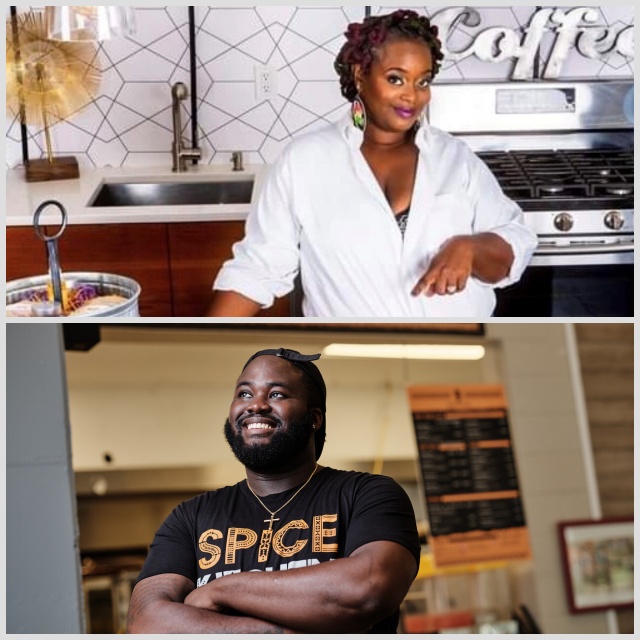
By Megan Sayles,
AFRO Business Writer,
msayles@afro.com
When Prince George’s County native Olumide Shokunbi noticed there was an opportunity in the fast-casual restaurant space for African food, he quickly acquired an LLC for Spice Kitchen West African Grill. Shokunbi’s plan worked like a charm, and soon, he was well on his way to opening a Nigerian fusion eatery.
He promised himself he would begin operations in 2020, still unsure if he wanted to run a food truck or brick-and-mortar restaurant. Then a global pandemic hit.
Shokunbi’s dream of a restaurant, bustling with customers as chefs worked their magic in the kitchen, crumbled as the coronavirus spread throughout the D.C., Maryland and Virginia (DMV) area.
“I had to pivot. The concept of a ‘ghost kitchen’ became more prevalent around that time, so I started doing more research,” said Shokunbi.

(Photo courtesy of Olumide Shokunbi)
“Ghost kitchens,” also known as “cloud kitchens,” work out of third-party commercial spaces and serve food solely by delivery. They do not have a dine-in space.
“I decided to completely pivot to the ghost kitchen route because it made complete sense. I didn’t have to be worried about driving a food truck around,” said Skokunbi, who hopes Spice Kitchen West African Grill will become the Chipotle of West African Food.
Shokunbi first secured a space for his ghost kitchen in Mess Hall, a culinary incubator space in D.C., in 2020. The first-generation Nigerian-American, devised the concept for Spice Kitchen West African Grill because he wanted to change the way people thought about African food. He wanted the dishes to be approachable and familiar, but full of traditional West African spice.
After a year, he moved to miXt Food Hall in Prince George’s County. His meals feature typical proteins, like shrimp, steak, chicken and salmon, but they are also seasoned with suya spice, or yaji. His spiced wings, which get tossed in honey and suya spice, are a customer favorite.
Since the pandemic forced people to shelter in place, Shokunbi figured the concept could work– so long as he leveraged social media to spread the word.
“Good companies were using a lot of TikTok and Instagram. Social media [became] the driving force for all businesses that were going to thrive during the pandemic,” said Shokunbi. “I got on it, and we’ve just been pushing and trying to deliver great food and great service.”
Though social media could spread the word about his business, it couldn’t help with the supply chain issues caused by the COVID-19 pandemic.
“Supply chain issues were a really big problem for us. Being such a small business trying to enter the world of U.S. Foods and Sysco, you’re not meeting the [minimum] amount of cases and boxes,” said Shokunbi. “You couldn’t rely on Restaurant Depot because they might not have what you need.”
Prices were raised and extra fees had to be added to offset the high cost of food.
“It wasn’t what I wanted to do for the customer, but it just came to the point where we wouldn’t make money unless we did that,” said Shokunbi. And he wasn’t alone.

LaWann Stribling, the baker behind Strib’ble Treats Homemade Sweets, fared well at the onset of the viral pandemic. But her luck didn’t last long. Eventually she says she had to raise her prices to cope with the pandemic and save her business.
The Northwest D.C. native sells scratch-made desserts, including cookies, brownies, cakes, cocoa bombs, cupcakes and pies. Stribbling works out of her home and at area farmers markets. The bakery is run under her company Stribble District, which was established in 2019.
“I panicked at first a little bit because I had to shut down, but when they allowed people to do curbside pick-up and delivery, I realized I qualified for that and made it happen,” said Stribling. “I just began advertising, and that year I actually did really well. I think it was because people were home, and they had access to money.”
In 2021 and into 2022, Stribling began to struggle with the high costs of goods and a slowdown of business. Nearly all of the basics needed for baking spiked in price, aside from flour.
“I shop at Sam’s Club, and I get a four-pack of butter. That went from $10 to $14. Because I use organic, cage-free eggs, a 24-pack was $10 and before it was like $5,” said Stribling. “I did temporarily raise my prices on cookies from $5 a cookie to $6 a cookie because I needed to make a profit.”
Today, Stribling says she’s seen prices come down on a lot of the items she uses day-to-day. In the midst of the pandemic, she was also able to win a $5,000 small business grant from the Prince George’s County Economic Development Corporation, which helped her to keep the bakery running.
However, Stribling said there needs to be more opportunities for small business funding outside of loans for minority entrepreneurs to thrive.
“We need funding available for small businesses– especially for people who are coming from the background of chattel slavery,” said Stribling. “It shouldn’t be this difficult to grow your business without asking for a loan. People don’t want to be in debt.”
Megan Sayles is a Report for America Corps member.
Related Articles:
The post How we made it over: a look at how Black restaurants in the nation’s capital survived a global pandemic appeared first on AFRO American Newspapers .











